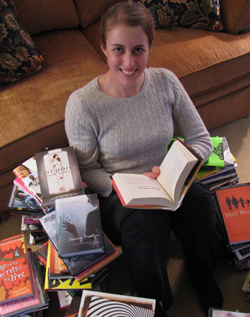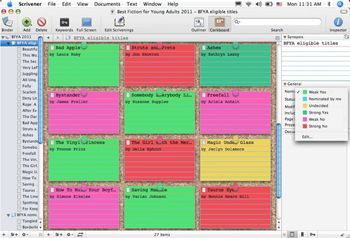| Sun | Mon | Tue | Wed | Thu | Fri | Sat |
|---|---|---|---|---|---|---|
| 1 | 2 | 3 | 4 | 5 | ||
| 6 | 7 | 8 | 9 | 10 | 11 | 12 |
| 13 | 14 | 15 | 16 | 17 | 18 | 19 |
| 20 | 21 | 22 | 23 | 24 | 25 | 26 |
| 27 | 28 | 29 | 30 | 31 |
CATEGORIES
RECENT ENTRIES
BLOG ROLL
A year of YA lit
 As a Chicago undergraduate, Jennifer Barnes, AB’05, tutored a sixth-grade Lab student who devoured young-adult literature—everything from Carolyn Mackler novels to the Gossip Girl series. The student loaned her books to Barnes, who became hooked too.
As a Chicago undergraduate, Jennifer Barnes, AB’05, tutored a sixth-grade Lab student who devoured young-adult literature—everything from Carolyn Mackler novels to the Gossip Girl series. The student loaned her books to Barnes, who became hooked too.
Barnes graduated with an English literature degree, earned a master’s in library science from Boston’s Simmons College, and worked for three years as a teen librarian at Homewood Public Library, 25 miles south of Chicago’s Loop.
This month she moved to Cambridge, Massachusetts, where she is searching for a new librarian post, working on a personal creative writing project, reviewing manuscripts for the Amazon Breakthrough Novel contest, and serving on the 2011 Best Fiction for Young Adults Committee (BFYA). Sponsored by the Young Adult Library Services Association, BFYA draws up an annual list of recommended YA fiction titles. Committee members can receive up to 80 books a month from publishers who hope their titles will nab a spot on the list.
In early April UChiBLOGo interrupted Barnes’s reading marathon to ask about her BFYA appointment:
When did you become part of the committee? What does your position entail?
My one-year term started in late January. The committee will convene in June and again next January. We’ll meet 9-5, five days in a row each time. Committee members nominate books throughout the year, informing other members of their picks. We’ll vote on the nominated books when we convene, and the final list will be released in January. Last year approximately 120 titles made the cut.
How many books have arrived so far? Have you read them all?
Because I’m moving to Cambridge, I arranged to have the books sent to my parents’ home in Massachusetts. My mom has been e-mailing me the titles that come in—so far I’ve received 98. I enter each title onto a spreadsheet and then go to the library and check out the ones I want to read. We aren’t required to read each book we receive, but we are expected to read each book that is nominated. Last year, there were 224 titles nominated. And we don’t have to limit ourselves to the books we receive from publishers. We can nominate any piece of YA fiction published between September 1, 2009 and December 31, 2010.
How are you pacing yourself?
I’ve been trying to read a book a day, but so far I’ve fallen a bit short of that goal. At first, when I didn’t have a big stack of eligible books to read, I also read some books from the previous year to become accustomed to the pace. I’ve read 48 books since my term began, and I’m also trying to chronicle the process on my blog.

How are you organizing everything?
I started with Excel, but that drove me crazy. Now I’m using a program called Scrivener. I’ve created virtual corkboards to which I add note cards that state the title and author of a particular book. Then I color-code each card to indicate whether or not I think it should be on the final list.
What do the different colors mean?
The point is to go along the traffic-light color spectrum from “go” to “no.” Dark green is a strong yes; light green is a weak yes; yellow is undecided; pink is a weak no; red is a strong no. And blue designates a book that I nominated.
Have you nominated any books yet?
Five so far. Just today I nominated Fat Cat by Robin Brande and Will Grayson, Will Grayson by David Levithan and John Green.
Why those two?
Fat Cat is an excellent book within what’s known as the “Fat Lit” genera. It’s about a girl who’s competing in her school’s science fair. She adopts the eating habits of a cavewoman for her project and loses weight as a result. I think the author handles the weight theme well. Brande never specifies how much the protagonist weighs or the number of pounds she loses. Sometimes these sorts of books state over and over that a character is overweight. It’s shoved down your throat, and you can’t tell where the author is going with it. And that’s a small gripe I have with Will Grayson, Will Grayson. The book has two protagonists, both of whom are named Will Grayson. One of them is described repeatedly as “fat.” Once someone’s physical description is established, there’s no need to restate those characteristics—unless you're Stephenie Meyer.
But you liked the book enough to nominate it?
We need to be honest in our nominations. You can acknowledge that a book has a certain weakness, but argue that all the strengths outweigh that one weakness.
Katherine E. Muhlenkamp
April 19, 2010
